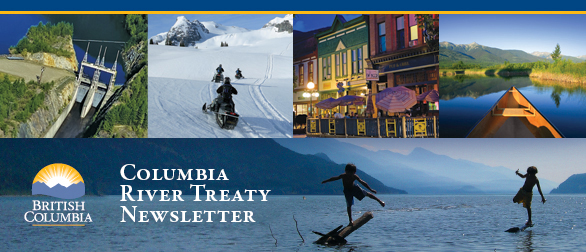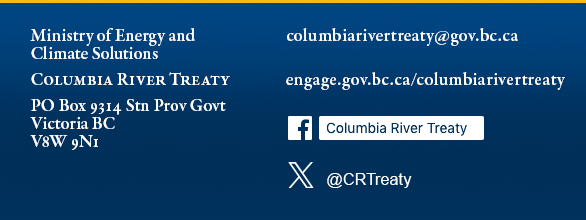Columbia River Treaty
Edition: February 2022

Connecting learners with the Columbia River
Feb 14, 2022
Written by the Wildsight Education Team
It has now been three and a half years since Wildsight first took a group of teenagers down the Columbia River in canoes as part of the Columbia River Field School (CRFS). Though the program has been stalled for two summers due to COVID-19, the CRFS experience - and the faces of our 32 alumni - are still fresh in our memories: the growing laughter that bubbles up as the group’s nerves give way to boisterous energy, the surprise of encountering such special places in one’s own backyard, the focus with which the students play out their roles in a mock negotiation of the Columbia River Treaty, and their reflections on new ties to people and place.
At Wildsight we’ve tried to make the most of the pandemic hiatus. Freed from planning trip logistics, we identified a need to make the kind of learning we do in the CRFS accessible to more students than can participate in a 15-day summer adventure. From this, ‘Teach the Columbia’ (TTC) was born.
Teach the Columbia is a curriculum package meant to help educators engage their students with the many dimensions of the Columbia River watershed — past, present, and future. It is primarily intended for high school students, but we hope that extensions also make it suitable for college classes. The first version includes 11 lesson plans spit into four different cross-curricular modules:
- Geography and History of the Columbia River Basin
- Columbia River Ecology
- Dams and Development on the Columbia River
- What is the future of the Columbia River Basin?
Essentially, we have reshaped the CRFS curriculum into a format that can be used in the classroom or at home. The lessons are designed to be flexible and adaptable; teachers can use all 11 lessons or pick and choose. As much as possible, the content has been linked to B.C.’s school curriculum with clear core competencies and thematic integration with common subject areas. Whether you’re a formal educator, a water resource professional, working in government, or simply a curious watershed resident, we encourage you to check out the lessons and supplemental materials. The more people learning and thinking about the Columbia River, the brighter its future will be!
Since the early days of launching the CRFS, we have heard from many adults that they, too, would like to paddle the river, listening to varied guest speakers and building a community of learning. We’re excited to say that this offering may soon become available. COVID-19 risk management permitting, we’re hoping this year will see the re-start of the CRFS for high school students. Beyond that, we’re also aiming to launch two shorter, four to five-day adult field courses—one for educators and one for government officials.
Additional opportunities for members of the public may follow towards the end of 2022 and in years to come. With so much transformational potential, it’s an exciting time to be involved with the Columbia Basin watershed. We thank all those who have made our work possible.


